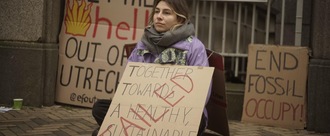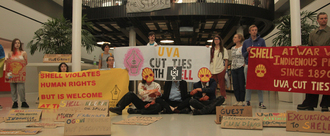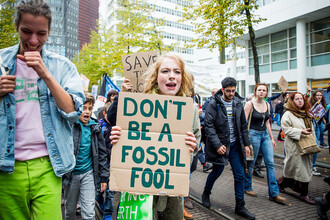-
SUPPORT OUR DEMANDS TO UTRECHT UNIVERSITYThe climate catastrophe is now, it is a real threat to human and planetary well-being, and we are extremely close on time to avoid worse consequences. This was the conclusion of the latest IPCC report, in which the world’s leading scientists call for a radical and fast transformation of our economy, politics, and society: “We are at a crossroads. The decisions we make now can secure a livable future”. We need research that truly works towards the University’s vision of “a better world”, and that removes barriers to achieving this. Universities must create room for nurturing radical new ideas and provide their students and staff with the tools necessary to be a part of transforming our society.247 van 300 HandtekeningenGemaakt door EFO Utrecht
-
Manifesto: Call for WUR to cut ties with the fossil fuel industryThe petition will be used to show to the board that there is an overwhelming amount of concerned staff and students who care about our commitments as a university!668 van 800 HandtekeningenGemaakt door Concerned student and staff
-
We ask our executive boards to cut the ties with the fossil fuel industryUniversities are closely tied to the fossil industry through student "eco-awards", campus recruitment activities, alumni networks, research funding and sponsorships of student associations. Those ties are increasingly under pressure. Under the banner of End Fossil: Occupy! students occupied Erasmus University Rotterdam, Eindhoven University of Technology and the University of Amsterdam. Dutch researchers and internationally respected climate scientists emphatically backed the students' demand: cut the ties with the fossil industry. A new consensus seems to be emerging in the responses from executive boards. The enthusiasm of students and staff is spoken of with understanding. But there is nothing wrong as long as we work on 'green' projects with the industry. Here, soothing words like 'dialogue,' 'connection' and 'innovation' are used. Go back to work or study in peace. With this response, the boards are getting off too easy. It seems primarily motivated by maintaining research funding and a sustainability image. There is no room for the fundamental question of what we stand for as an academic community. That's problematic. First of all, that community stands for truth-telling. We strive to tell the truth without hiding existing uncertainties. For the fossil industry, truth has proven to be a much more malleable concept. As the scientific evidence on climate change accumulated, it began vilifying climate scientists and funding doubt campaigns that continue to affect the social polarization surrounding climate change in the United States to this day. In the Netherlands, Shell made a contribution by funding climate skeptic Frits Böttcher. Second, the academic community stands for countering bias. However, research centers sponsored by the fossil industry write significantly more positively about gas than centers where such sponsorship is absent or much less present. And for decades, industry-sponsored economists focused only on the perceived costs of effective climate policy without including the benefits. Companies still so deep in oil and gas will try to secure their fossil interest - especially through research projects that provide a green image. Finally, the academic community stands for a just and livable future. For a fair transition with no more than one and a half degrees of warming, rich countries like the Netherlands must phase out fossil fuels completely by 2034. You don't need to come up with this with fossil fuel companies. Released communications show that Shell employees are internally told that a path towards net zero emissions "has nothing to do with our business plans". External research also confirms that Shell is still busy with new fossil infrastructure - such as under the Wadden Sea - which cannot be built at all if we want to meet the climate goals. Addressing the climate crisis requires a strong academic community that defends truth-telling, does not accept bias and takes seriously its concern for future generations. On that basis, it should cut all ties with corporations that knowingly work toward an unlivable future. Fossil companies are willing to undermine climate science when it suits them better and they are they not on the path to a fossil-free world at a pace that does justice to the current crisis situation. The academic community we envision sets its own balanced research agenda for the transition. It is represented by the moral leadership of executive boards who dare to make difficult choices and take a stand against the rhetoric that we must "transition with fossil fuel companies". That such leadership is possible is proven by the severing of ties with the South African apartheid regime in the 1970s and very recently with the tobacco industry and Russian and Belarusian educational institutions. Students and staff would prefer to be committed to the great social and technological challenges in the outside world. But as long as ties to fossil industries remain, the campus will also be the domain of their engagement.354 van 400 HandtekeningenGemaakt door Guus Dix
-
UvA, cut ties with Shell!Royal Dutch Shell was founded in colonial Indonesia in 1890. Since then, Shell has benefited from the horrendous practices of colonial extractivism and slavery, and has become one of the top 10 climate polluters in the world [1]. Across the globe, Shell’s business practices enrich a select few while leaving behind barren land, polluted water, sick people and damaged ecosystems, mainly in the Global South. Shell violates the human right for water when they pollute the Niger Delta, destroying the livelihoods of fisherfolks and local populations. Also in Nigeria they were involved in supporting the military dictatorship that tortured and killed the Ogoni 9 activists [2]. Shell violates Indigenous Mapuche people's rights by fracking on their ancestral land, in the country we call Argentina, in Vaca Muerta site [3]. There, too, they cause destruction: earthquakes, respiratory disease to local and Indigenous populations, diseases in animals from pollution, contaminated water, barren land and other horrors. UvA and Dutch universities partnering with Big Oil Despite Big Oil’s effort to lobby against progressive climate policy [4], to deceive the public through misinformation and deceptive promises for over 30 years [5, 6] and a ghastly legacy of destroying people’s livelihoods [7-9], our universities blindly ignore and legitimize their activities. The UvA has a list of connections with Shell: they have invited Shell to the UvA as guest lecturers [10], for discussion events [11][12] and for career events [13, 14] to promote themselves as the "frontrunners" in sustainable energy. In addition, students from the chemistry program are invited to visit Shell facilities, incentivising for a career there [15]. Lastly, shell funds several research projects at the UvA [11]. We demand this information to be accessible to the public for scrutiny. As students, we want our university to commit to fossil-free alternatives instead of Big Oil companies. The collaboration in sustainable research between UvA and Shell is simply greenwashing. Shell invests around 5% of their investments in sustainable energy while 95% goes to fossil fuels [16]. In this moment, they are extracting fossil fuels [17] and are making plans to expand their fossil fuel extraction for the future [18-20]. Shell has no real plan to phase-out from fossil fuels [16, 21], as they keep missing their own targets and as the 2021 Dutch case against them shows [22]. UvA is not the only Dutch university that is collaborating with Big Oil. Other universities like TU/e are aiding Shell in finding new fossil-based “production and exploration methods” [23], offering job opportunities in the fossil fuel industry at career events [24], as well as giving Big Oil the opportunity to exert their influence in extracurricular activities [25-27]. In this current time of the climate crisis we have limited amount of time to avoid climate break down. We have until 2028 to lower carbon emissions to stay below the 1.5 °C of global warming [28, 29]. Universities should be the leading example of this transition for the futures of their students and staff by not collaborating with controversial fossil fuel companies like Shell. To remain true to the UvA's values, like social responsibility, inclusion and sustainability [30-32], we cannot tolerate Big Oil at the UvA. Put your own words into action! Cut ties with Shell! *Big Oil: companies like Chevron, ExxonMobil, BP, Total, Shell, ConocoPhillips. That does not mean, however, that "small oil" or similar business are therefore acceptable. We focus on Big Oil but will not replace Shell for companies that abuse human rights, Indigenous rights and/or that are leading us towards climate catastrophe. Join us in demanding universities free of Big Oil! In solidarity with people fighting Shell and other harmful companies, University Rebellion UvA --- Signatories: (message us to sign on behalf of your group!) - Shell Must Fall - Milieudefensie - Milieudefensie Jong (JMA) - SRVU - Fossielvrij NL - Extinction Rebellion (XR) NL - Extinction Rebellion (XR) Amsterdam - BIJ1 Amsterdam - Students for Justice in Palestine (SJP) - The Decolonization Club - Scientist Rebellion NL - Activisten Partij UvA - ASVA studentenvakbond --- The petition has already been handover. However, we will continue collecting signatures because the CvB has decided TO KEEP THE TIES WITH THE FOSSIL FUEL INDUSTRY after a 4 month dialogue. Read their full report here https://tr.ee/rDGepEJG8s Keep up with the latest news by signing up for our email list and follow us on instagram @uvarebellion ! Want to know more about University Rebellion? Read our manifesto here! http://universityrebellion.nl/wp-content/uploads/2020/11/The-University-Rebellion-Manifesto-RGB.pdf --- Sources for climate justice and Indigenous rights perspectives -- Other references on http://universityrebellion.nl/sources-petition-uva-cut-ties-with-shell/ [I] American declaration on the Rights of Indigenous Peoples, June 15, 2016. [II] United Nations Declaration on the Rights of Indigenous Peoples, 13 September 2007. [III] United Nations Declaration on the Rights of Indigenous Peoples, 13 September 2007. [IV] Declaration of the Rights of Mother Earth, 22 April, 2010. Other references on universityrebellion.nl/act1.904 van 2.000 HandtekeningenGemaakt door University Rebellion UvA
-
Maak mijn pensioen schoon!Volgens het klimaatakkoord van Parijs en recente wetenschappelijke bevindingen moet alle uitstoot van broeikasgassen drastisch worden verminderd als we een enigszins leefbare wereld willen behouden. Hiertoe moet de fossiele industrie versneld worden afgebouwd. In weerwil van dit feit heeft ABP maar liefst € 17,4 miljard geïnvesteerd in meer dan 300 kolen-, olie- en gasbedrijven, onder meer in oliegiganten als Shell, ExxonMobil en Chevron. Naast het gegeven dat deze bedrijven betrokken zijn bij het zoeken naar onaangeboorde voorraden fossiele brandstoffen, lobbyen ze actief tegen effectief klimaatbeleid en schenden ze al decennialang de mensenrechten van inheemse volkeren. ABP investeert zelfs in bedrijven met kolenmijnen, concerns die boren in het kwetsbare Arctische gebied en ondernemingen die vervuilend schaliegas produceren. We kunnen deze hopeloos verouderde en levensbedreigende beleggingen in dit tijdsgewricht niet meer accepteren. We willen werken en studeren aan een fossielvrije universiteit. INVESTEREN IN FOSSIELE BRANDSTOFFEN IS NIET DUURZAAM Ook om financiële redenen baart het ons zorgen dat ABP investeert in een industrie die tot het verleden behoort. Financiële instellingen als het IMF waarschuwen voor de financiële risico’s van fossiele investeringen. Als we erin slagen om kolen, olie en gas in de grond te houden, zal het overgrote deel van de reserves van fossiele bedrijven niet gebruikt worden. Deze reserves worden dan zogenaamde ‘stranded assets’ en verliezen snel aan waarde, met een financieel verlies voor pensioendeelnemers. Daarnaast heeft recent onderzoek van wetenschappers Scholtens en Platinga aangetoond dat het rendement niet achteruit hoeft te gaan als ABP uit fossiel stapt (zie ook: https://www.trouw.nl/duurzaamheid-natuur/kolen-olie-en-gas-zijn-niet-nodig-voor-een-veilig-pensioen~b2632bf8/) BELEG IN ONZE TOEKOMST ABP moet stoppen met het financieren van de klimaatcrisis. ABP draagt als grootste pensioenfonds van Europa een enorme verantwoordelijkheid. Volgens artikel 135 van de Pensioenwet moeten pensioenfondsen beleggen op een manier die de belangen van de deelnemers ondersteunt. Het is overduidelijk dat investeren in opwarming van de aarde niet in ons belang is. Wat hebben we aan een oudedagsvoorziening in een onleefbare wereld? WAT VRAGEN WIJ VAN ABP? Om een veilige leefomgeving te garanderen voor de wereldbevolking, toekomstige generaties en pensioendeelnemers, moet het ABP gaanbijdragen aan een snelle en rechtvaardige energietransitie . ABP moet hiertoe de volgende stappen nemen: 1. afstoten van fossiele brandstoffen en schadelijke industrieën die grote schade aanrichten aan ecosystemen. 2. Een onafhankelijke externe commissie van wetenschappers instellen om te onderzoeken of ABP minimaal voldoet aan het 1,5 graden-scenario van het Parijs-akkoord. De commissie moet verder gaan en beslissen of de maatregelen van het Parijs-akkoord nog steeds voldoende zijn om ons veilig te houden, gezien meer recent onderzoek; 3. Het vrijgekomen geld investeren in eerlijke oplossingen voor de klimaatcrisis, zoals hernieuwbare energiebronnen. WAT KUN JIJ DOEN? Aangezien ons pensioen in handen is van zowel werkgevers als werknemers, is het belangrijk dat publieke instellingen hun invloed uitoefenen. Veel instellingen in Nederland treden op tegen ABP, waaronder de Technische Universiteit Delft, waar meer dan honderd medewerkers een brief naar ABP hebben gestuurd om te eisen dat het fonds stopt met fossiele brandstoffen. Soortgelijke inspanningen worden geleverd aan de universiteiten van Maastricht, Wageningen en Utrecht. Personeelsleden en bestuur komen samen om zich uit te spreken tegen de buitensporige investeringen van ABP. Wij sluiten ons bij hen aan. Wij verzoeken dat het CvB van de Universiteit van Amsterdam: - Zich uitspreekt tegen de investeringen in fossiele brandstoffen van ABP door middel van een openbare verklaring die online wordt gepubliceerd en via een persbericht wordt gecommuniceerd, en die wordt gedeeld via de belangrijkste nieuwsbrieven van de UvA en haar sociale media; - Onze onderwijsinstelling toevoegt aan de lijst van openbare instellingen die een fossielvrij pensioen willen via http://www.abpfossielvrij.nl/; - Druk uitoefent op koepelorganisatie VSNU en de Stichting Onafhankelijke Publieke Werkgevers (ZPW) om een fossielvrij pensioen te eisen van het ABP; - Rechtstreeks contact opneemt met ABP om haar bezwaren kenbaar te maken; Met vriendelijke groet, Medewerkers en studenten van de Universiteit van Amsterdam1.110 van 2.000 HandtekeningenGemaakt door UvA Fossilfree

-
Radboud: Beëindig financiering van de klimaatcrisisKlimaatwetenschappers, ook van de Radboud Universiteit, waarschuwen dat het noodzakelijk is om de opwarming van de aarde tot gemiddeld 1,5 graad Celsius te beperken. Een hogere opwarming zal natuurlijke bronnen, ecosystemen, biodiversiteit, en voedselzekerheid wereldwijd veel erger beschadigen. Om de opwarming nog op tijd te stoppen is onmiddellijk daadkracht nodig. Maar ABP beheert pensioenen voor medewerkers van de Radboud Universiteit. Zij investeert in totaal ruim 17 miljard euro pensioengeld in bedrijven die de 1,5 graad doelstelling in gevaar brengen. Dat geldt bijvoorbeeld voor Total, Shell, Exxon Mobil, BP en Chevron. . . . . . Meer informatie 1) IPCC over 1,5C temperatuurstijging (zie chapter 3): https://www.ipcc.ch/sr15/ 2) Interview met een klimaatbeleidswetenschapper van de Radboud Universiteit over 1,5C temperatuurstijging: https://www.ru.nl/nieuws-agenda/nieuws/vm/iwwr/2018/1-5-graad-temperatuurstijging-snel-daadkrachtig/ 3) Een artikel over de uitdagingen om de temperatuurstijging tot 1,5C te beperken: https://www.mckinsey.com/business-functions/sustainability/our-insights/interactive-the-1-point-5-degree-challenge# 4) ABP en de Radboud Universiteit: https://www.ru.nl/werken-bij/vm-nieuwe-medewerker/algemene/ 5) Artikel van Fossielvrij Nederland over de investeringen van ABP https://631nj1ki9k11gbkhx39b3qpz-wpengine.netdna-ssl.com/nl/wp-content/uploads/sites/14/2020/10/Factsheet-ABP-en-fossiele-investeringen-1-oktober-2020.pdf 6) Overzicht van de beleggingen van ABP https://www.abp.nl/over-abp/duurzaam-en-verantwoord-beleggen/waarin-belegt-abp/ 7) Van 167 grote bedrijven is onder meer onderzocht of zij de 1,5C doelstselling zullen halen https://www.climateaction100.org/whos-involved/companies/?search_companies=total&company_sector=All . . . . . ENGLISH: We, students and employees of the Radboud University, ask the University Board to urge ABP to end all investments in companies that do not have a realistic plan to achieve the 1.5 degree target of the Paris Climate Agreement. Why is that important? Climate scientists, some of whom are working at the Radboud University, warn that it is necessary to limit global warming to an average of 1.5 degrees Celsius. If the temperature rise exceeds this level, it will cause significantly more damage to natural resources, ecosystems, biodiversity and food security worldwide. We need immediate action to stop the global warming in time. But ABP manages the pensions for Radboud University employees. It still invests a total of more than 17 billion euros of pension money in companies that jeopardise the 1.5 degree target. Companies like Total, Shell, Exxon Mobil, BP and Chevron. . . . . . More information 1) Information about 1.5C temperature rise on the IPCC website (see chapter 3): https://www.ipcc.ch/sr15/ 2) An interview with a Heleen de Coninck, climate policy scientist from Radboud University about 1.5C temperature rise: https://www.ru.nl/nieuws-agenda/nieuws/vm/iwwr/2018/1-5-graad-temperatuurstijging-snel-daadkrachtig/ 3) An article on the challenges of limiting the temperature rise to 1.5C: https://www.mckinsey.com/business-functions/sustainability/our-insights/interactive-the-1-point-5-degree-challenge# 4) ABP and Radboud University: https://www.ru.nl/werken-bij/vm-nieuwe-medewerker/algemene/ 5) An article by Fossil Free Netherlands about ABP's investments https://631nj1ki9k11gbkhx39b3qpz-wpengine.netdna-ssl.com/nl/wp-content/uploads/sites/14/2020/10/Factsheet-ABP-en-fossiele-investeringen-1-oktober-2020.pdf 6) Overview of ABP's investments: https://www.abp.nl/over-abp/duurzaam-en-verantwoord-beleggen/waarin-belegt-abp/ 7) Investigation of, among other things, whether 167 large companies will achieve the 1.5C target https://www.climateaction100.org/whos-involved/companies/?search_companies=total&company_sector=All275 van 300 HandtekeningenGemaakt door Jurjen Kraan
-
Docenten van Maastricht University willen een fossielvrij pensioenVolgens het klimaatakkoord van Parijs moet onze uitstoot drastisch naar beneden, willen we kans houden op een leefbare wereld. Toch investeert ABP maar liefst 17,4 miljard in meer dan 300 kolen-, olie- en gasbedrijven, waaronder grote oliereuzen als Shell, ExxonMobil en Chevron. Als we alle kolen, olie en gas opboren die nu al gevonden is, stijgt de temperatuur al vele malen verder dan 2°C, waardoor de gevolgen van klimaatverandering steeds extremer worden. Het is daarom noodzakelijk dat alle zoektochten naar nieuwe fossiele projecten onmiddellijk gestaakt worden, en de meest vervuilende industrieën zoals kolen, schaliegas en teerzand zo snel mogelijk afgebouwd worden. ABP moet daarom bedrijven die hierbij betrokken zijn uitsluiten van haar beleggingen, en divesteren uit de fossiele industrie. INVESTEREN IN FOSSIEL IS ONVERSTANDIG Ook om financiële redenen baart het mij zorgen dat ABP investeert in een industrie die tot het verleden behoort. Financiële instellingen zoals het IMF waarschuwen voor de financiële risico’s van fossiele investeringen. Als we erin slagen om kolen, olie en gas in de grond te houden, zullen de meerderheid van de reserves van fossiele bedrijven niet gebruikt worden. Deze reserves worden dan zogenaamde ‘stranded assets’, en verliezen snel aan waarde, met een financieel verlies voor pensioendeelnemers. Daarnaast heeft recent onderzoek van wetenschappers Scholtens en Platinga aangetoond dat het rendement niet achteruit gaat als ABP uit fossiel stapt (zie ook: https://www.trouw.nl/duurzaamheid-natuur/kolen-olie-en-gas-zijn-niet-nodig-voor-een-veilig-pensioen~b2632bf8/) BELEG IN ONZE TOEKOMST ABP moet stoppen met het financieren van de klimaatcrisis. Als grootste pensioenfonds van Europa heeft ABP een grote verantwoordelijkheid. Volgens artikel 135 van de Pensioenwet moeten pensioenfondsen beleggen in het belang van deelnemers. 58 procent van de ABP deelnemers geeft aan een duurzaam pensioen te willen. Het is overduidelijk dat investeren in de verhitting van de aarde niet in ons belang is. Wat hebben we aan een oudedagvoorziening in een onleefbare wereld? WAT KUN JIJ DOEN? Ons pensioen ligt in handen van werkgevers én werknemers, dus ik vraag je om als publieke instelling je invloed op ABP uit te oefenen. Zou je de volgende stappen willen zetten? - Spreek je uit tegen de fossiele investeringen van ABP, en voeg onze onderwijsinstelling toe aan de lijst van publieke instellingen die een fossielvrij pensioen willen op http://www.abpfossielvrij.nl - Verzoek de VSNU én de Stichting Zelfstandige Publieke werkgevers (ZPW) om bij ABP een fossielvrij pensioen te eisen. - Neem contact op met ABP om je bezwaren kenbaar te maken. Samen kunnen wij zorgen dat ons pensioen bijdraagt aan een rechtvaardige transitie, met respect voor mensenrechten wereldwijd. Ik reken op je! Vriendelijke groet, JE KUNT DIT ONDERTEKENEN ME JE EIGEN NAAM Docent op ##NAAM SCHOOL##1 van 100 Handtekeningen





.png)

